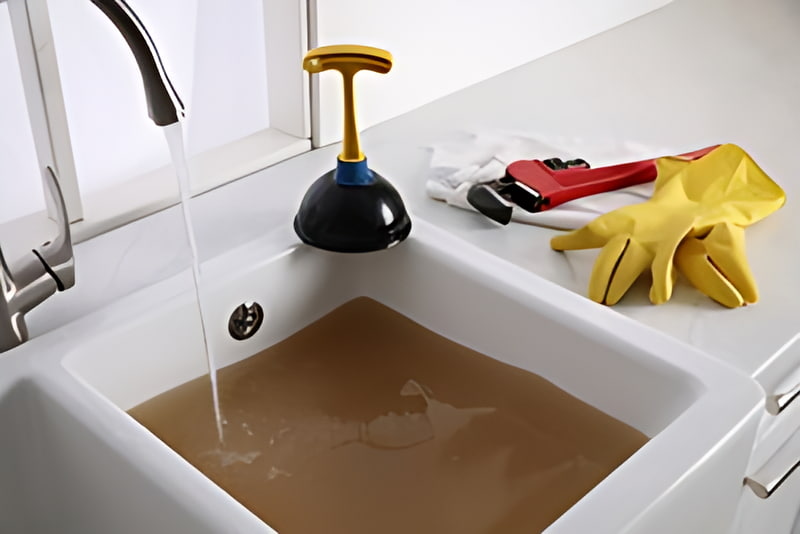Sinks are an integral part of our kitchens and bathrooms, but they are prone to blockages. A blocked sink can disrupt your daily routine and become a source of stress. This comprehensive guide will walk you through various methods to unblock a kitchen sink, ensuring your sink’s functionality is restored swiftly and efficiently. Whether you’re facing a minor clog or a major blockage, this article is worth reading as it offers practical, easy-to-follow solutions for every scenario.
Understanding Sink Blockages: What Causes Them?
Sink blockages are caused by a buildup of debris, often grease, food scraps, hair, or other foreign objects, that obstructs the flow of water through the drain. Grease, in particular, is a common culprit, as it solidifies when it cools, forming a sticky barrier that traps other debris.
Is Your Kitchen Sink Blocked? Initial Assessment Steps
Before embarking on your DIY unblocking mission, it’s essential to confirm that your sink is indeed clogged. Here are some signs to look for:
- Water draining slowly or not at all
- A gurgling or bubbling sound coming from the drain
- Water backing up into the sink basin
If you’ve observed these signs, it’s time to take action.
The Magic Duo: Unblocking with Baking Soda and Vinegar
Baking soda and vinegar are a tried-and-tested combination for unclogging sinks. The fizzing reaction between these two ingredients creates a powerful force that can break down grease and food particles, clearing the blockage.
Steps:
- Pour 1/2 cup of baking soda into the drain.
- Follow with 1 cup of white vinegar.
- Cover the drain with a plunger or a stopper to trap the fizzing action.
- Let the mixture sit for about 30 minutes.
- Flush the drain with hot water.
Plunging into Action: How to Use a Plunger Effectively
A plunger is a versatile tool that can be surprisingly effective in unclogging sinks. However, proper technique is crucial for optimal results.
Steps:
- Place the plunger’s cup over the drain, making sure it creates a tight seal.
- Fill the sink with enough water to cover the plunger cup.
- Plunge forcefully up and down, creating suction that dislodges the blockage.
- Flush the drain with hot water.
Boiling Water: A Simple Yet Effective Unblocker
Boiling water can effectively melt grease and dissolve food particles, clearing blockages in shallow pipes.
Steps:
- Bring a pot of water to a boil.
- Carefully pour the boiling water down the drain, directing it towards the blockage.
- Let the hot water sit for a few minutes.
- Flush the drain with hot water.
When to Call a Plumber: Recognizing Professional Help Need
If your DIY attempts fail to clear the blockage, it’s time to call a professional plumber. Here are some signs that indicate professional intervention is necessary:
- The blockage is severe and the sink is completely blocked.
- You have tried multiple DIY methods without success.
- You suspect a more complex plumbing issue, such as a broken pipe or a tree root intrusion.
Unblocking Without a Plunger: Alternative Methods
If you don’t have a plunger, there are still alternative methods you can try:
-
Hair Snare: Wrap a wire hanger into a circular loop and use it to snag hair and debris trapped in the drain.
-
Bottle Brush: Insert a bottle brush into the drain, rotating it to dislodge stuck debris.
-
Drain Snake: A drain snake is a long, flexible cable specifically designed for clearing blockages.
Preventing Future Sink Blockages: Tips and Tricks
To minimize the risk of future sink blockages, follow these preventive measures:
-
Dispose of Grease and Oil Properly: Let grease and oil cool completely and solidify before putting them in the trash. Never pour grease or oil down the drain.
-
Prevent Food Scraps from Going Down the Drain: Use a drain strainer to catch food scraps and rinse them into the trash instead of the sink.
-
Regular Plumbing Maintenance: Have your drains cleaned and inspected by a plumber periodically to prevent buildup and blockages.
-
Avoid Using Harsh Chemicals: Harsh chemicals can damage pipes and are not always effective in removing blockages. Stick to natural solutions like baking soda and vinegar.
Unclogging a Bathroom Sink: Is It Different?
While the basic principles of unclogging a kitchen sink apply to bathroom sinks as well, there are a few subtle differences to keep in mind. Bathroom sinks often have a smaller drain opening, making it more challenging to use a plunger effectively. Additionally, bathroom sinks may be more prone to hair clogs due to hair washing and shaving.
Tips for Unclogging a Bathroom Sink:
- Use a smaller plunger specifically designed for bathroom sinks.
- Be more cautious when plunging, as a strong suction force can damage the sink’s porcelain surface.
- If hair is the culprit, try using a hair snare or a drain snake specifically designed for hair removal.
DIY Drain Unblockers: Safe and Effective Homemade Solutions
In addition to baking soda and vinegar, several other DIY drain unblockers can be effective in clearing minor blockages. These natural solutions are safer for your pipes and the environment than harsh chemical drain cleaners.
- Salt and Vinegar: Combine equal parts salt and vinegar, pour down the drain, and let it sit for 30 minutes. Flush with hot water.
- Salt and Boiling Water: Pour a handful of salt down the drain, followed by boiling water. The salt can help break down grease and the boiling water can dissolve other debris.
- Lemon Juice: Pour a cup of lemon juice down the drain and let it sit for an hour. The acidity of the lemon juice can help dissolve grease and food particles.
By following these DIY methods and preventive tips, you can keep your sinks flowing freely and avoid the hassle of clogged drains.
What is the best thing to unblock a sink?
The most effective method to unblock a sink is by using a sink or pipe unblocker, a chemical solution specifically designed to dissolve clogs. Alternatively, a plunger can also be used with physical force to remove blockages. For stubborn clogs, professional plumbing services may be necessary to ensure the blockage is properly cleared.
Why you should never use baking soda and vinegar to unclog a drain?
Using baking soda and vinegar to unclog a drain is not advisable because it can lead to pipe corrosion over time. The reaction between baking soda and vinegar creates a mixture that doesn’t effectively dissolve clogs. Instead, it could harden in the pipes, making the blockage worse. Thus, it’s better to use designated drain cleaners or hire a professional.
Does bicarb unblock sinks?
Yes, bicarbonate of soda or baking soda can effectively unblock sinks. It works by breaking down the fatty acids in the clog to soap and glycerine, hence, easing the drain blockage. Typically, you mix it with vinegar or hot water before pouring into the drain. However, it may not work on severe clogs.
Does bleach unblock sinks?
While bleach does have the ability to kill and disintegrate certain bioorganic compounds like mold and fungus, it is not actually effective in unblocking sinks. The common materials causing blockages – hair, food, grease – are largely resistant to bleach. Therefore, it’s advisable to use specialized drain cleaners or professional plumbing services.
Key Takeaways
- Regular maintenance and careful use are key to preventing sink blockages.
- Baking soda and vinegar can be a powerful combination for clearing blockages.
- A plunger is a handy tool in tackling most sink clogs.
- Boiling water is a quick fix for minor grease-related blockages.
- Know when to call a professional plumber for persistent or severe clogs.
- Avoid chemical cleaners as much as possible to protect your pipes and the environment.
By following these tips and techniques, you can keep your sinks clear, functional, and in good health for years to come.




